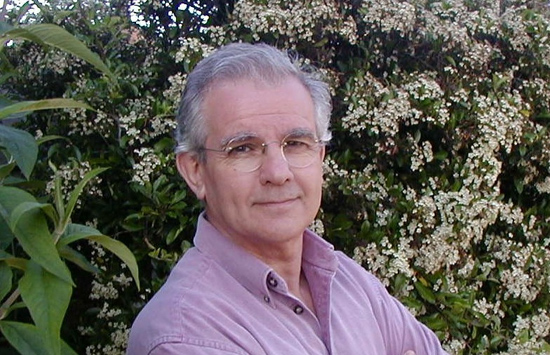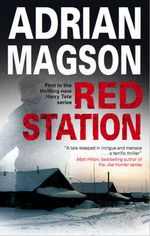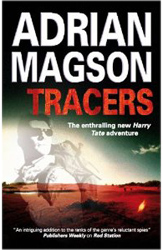Adrian Magson is a freelance writer and lives in England. The author of five books in the Riley Gavin/Frank Palmer series based in London, he is currently working on two new series: Harry Tate thrillers and Inspector Lucas Rocco crime series. Apart from writing novels and short stories (his recently published short fiction has appeared in 'Plots With Guns', on Sniplits.com (audio), Thuglit and in the Mammoth Book of Best British Crime 2010 (ed Maxim Jakubowski) - Adrian also reviews thrillers for Shots Magazine - and writes the 'Beginners' and 'New Author' pages in WRITING Magazine (UK).

I think most writers are always looking for something else to write. It’s what makes us do what we do – to conjure up something new for others to read. For me, after writing a series of five crime novels set in and around London (the Riley Gavin/Frank Palmer series), it was a spy thriller… or, more accurately, a thriller set in the world of the Intelligence operative which appealed. I’d always loved spy themes by the likes of Alistair MacLean, John Gardner, Berkely Mather, Gavin Lyall, Len Deighton and John le Carré. Their characters weren’t always spies in the conventional sense, the faceless embassy staffers and trade delegates recruiting agents, schmoozing at embassy dinners and business lunches, or even those using ‘dead drops’ to collect secret documents and so forth, but were often working outside that remit. It was these loners who usually played a more physical part which interested me.
I’ve been asked why the spy genre seemed to go out of fashion for a long time. Actually, I don’t believe it did – I think it merely morphed into action thrillers but the threats changed to serious international crime or the world-domination-by-madman kind of theme. As a reversal of that, I currently enjoy ‘Spooks’ and other spy-related films (the Bourne trilogy), because they still bring in the same kind of action stories as crime thrillers, but with bigger backdrops and different themes such as conspiracies and terrorism.
Real spies will argue (quite rightly) that violence and gunplay form no part of their world because they’d never last long if it did; retaliation from opposing agencies would soon escalate just the same as embassy officials are expelled in a tit-for-tat operation following a spy scandal – and imagine what would happen if that retaliation went physical. Yet there has always been a huge public interest in the more action-related versions of the espionage game, and I wanted to put down my version of it.
 In Red Station I decided on a contemporary theme, using the backdrop of a real event – the Jean Charles de Menezes shooting – to provide the fuel for why an MI5 officer (Harry Tate), should be hustled out of the country to avoid yet another press investigation after innocent civilians were shot dead in an MI5/police drugs intercept. It’s based on the ‘what if?’ principal; what if he discovers on arrival at his new station that he has been sent to a punishment posting for washed-out spooks from both MI5 (Security Service) and MI6 (SIS), but is also set up for assassination by a government hit squad?
In Red Station I decided on a contemporary theme, using the backdrop of a real event – the Jean Charles de Menezes shooting – to provide the fuel for why an MI5 officer (Harry Tate), should be hustled out of the country to avoid yet another press investigation after innocent civilians were shot dead in an MI5/police drugs intercept. It’s based on the ‘what if?’ principal; what if he discovers on arrival at his new station that he has been sent to a punishment posting for washed-out spooks from both MI5 (Security Service) and MI6 (SIS), but is also set up for assassination by a government hit squad?
Harry Tate is not a James Bond; he is seen by his superiors as a solid, reliable yet undistinguished performer. Nor is he a former Special Forces type, although like many Intelligence operatives he has an military background and is prepared to use firearms when necessary. He’s not overtly physical or gung-ho, but when desperation calls he knows how to look after himself in a tight spot. He’s also accustomed to following orders; it’s what makes him obey without question the order to leave everything behind under a strict ‘No Contact’ rule and disappear abroad. But when he finds that he has been duped by his bosses, and that two previous members of the Red Station punishment squad have disappeared without trace on their way home, in spite of official indications to the contrary, he becomes his own man. Resolving the conflict between duty, training and the instinct for self-preservation, he decides to fight back against what he sees as a massive betrayal and get back home, taking with him whoever wants to go.
That Harry has to deal with the Russians coming across the border and potentially scooping up him and his new colleagues was something I hadn’t actually figured on happening in real life. It was something I had written in – but days before it actually happened. Thanks to Prime Minister Putin, I was suddenly faced with either junking that part of the book or going with it. In the end, because I hate throwing anything away, even if a judo-playing former KBG action man gets a little antsy with his local world order, I decided to keep it in because it was a truly viable threat and one a trained MI5 officer like Harry would recognise and react to instinctively.
That, incidentally, leads me to on to the recent revelations about Russian ‘sleepers’ (long-term undercover spies) in the US, and allegations about our own agents (other nationals working for us) or officers (our own staff) collecting document ‘drops’ in Moscow (in this case, disguised rocks rather like the ones you can buy to store a spare key in). These incidents show that the Cold War style of espionage has never gone away, nor has the public interest in what goes on in the spy game diminished. It also proves that there’s very little we writers can make up, no matter how original we like to think we are.
 What was enjoyable about Red Station was that it allowed me to bring in characters who could form part of this and some of the following books in the series (the sequel is Tracers - Spring 2011). Rik Ferris is an MI5 computer nerd, who keeps Harry in the loop; Clare Jardine is an MI6 killer with a nasty taste for cold steel; Henry Paulton is Harry’s former MI5 boss and Grand Betrayer, who gives Harry his own interest in revenge. They developed as I wrote them, to an extent that I decided that they should come back, even though at least two of them were not people you’d care to share a lift with. Because of circumstances involving Harry’s banishment, in Tracers I also shifted him out of MI5 (his treatment was an embarrassment the establishment didn’t want), although he’s never far from it because he’s ‘carded’ – a civilian allowed to carry a firearm but on call if he is ever needed. (The security services use sub-contractors just like other government departments – it’s cheaper and deniable and there’s a wealth of highly-trained talent out there).
What was enjoyable about Red Station was that it allowed me to bring in characters who could form part of this and some of the following books in the series (the sequel is Tracers - Spring 2011). Rik Ferris is an MI5 computer nerd, who keeps Harry in the loop; Clare Jardine is an MI6 killer with a nasty taste for cold steel; Henry Paulton is Harry’s former MI5 boss and Grand Betrayer, who gives Harry his own interest in revenge. They developed as I wrote them, to an extent that I decided that they should come back, even though at least two of them were not people you’d care to share a lift with. Because of circumstances involving Harry’s banishment, in Tracers I also shifted him out of MI5 (his treatment was an embarrassment the establishment didn’t want), although he’s never far from it because he’s ‘carded’ – a civilian allowed to carry a firearm but on call if he is ever needed. (The security services use sub-contractors just like other government departments – it’s cheaper and deniable and there’s a wealth of highly-trained talent out there).
I enjoyed writing Red Station and Tracers to a huge degree, and creating the world of Harry Tate. And if readers get anywhere near the same level of enjoyment out of them I’ll be a very happy author indeed.
RED STATION – the first in a new spy series - published by Severn House – August 2010 – h/b £19.99. Read SHOTS' review
TRACERS - published by Severn House - February 2011 - b/b £19.99
More can be found at www.adrianmagson.com
order abortion pill online
abortion pill buy abortion pills online
i love my boyfriend but i cheat
click i want to cheat on my boyfriend
why do people cheat
go i dreamed my wife cheated on me
free cialis coupon
read cialis free sample coupons
coupons for cialis printable
go cialis coupons free
priligy kokemuksia
priligy priligy resepti
where can i buy low dose naltrexone
link naltrexone uses
low dose naltrexone where to buy
link naloxone for alcoholism